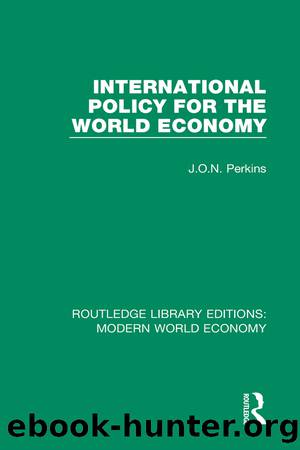International Policy for the World Economy by Perkins J. O. N.;

Author:Perkins, J. O. N.;
Language: eng
Format: epub
Publisher: Taylor & Francis Group
THE RELEVANCE OF EXISTING PREFERENCES
Certain groups of underdeveloped countries already enjoy preferences in the markets of certain developed countries. The countries associated with the EEC enjoy preferences in the Community, and certain Commonwealth countries have preferences in Britain and in some other Commonwealth countries. It has been suggested that these preferences should be extended to the exports of all underdeveloped to all developed countries (or, at least, to North America and Western Europe). But naturally this gives rise to problems. For one thing, the underdeveloped countries that lost their privileged position would have objections. For another, those developed countriesâespecially the USAânot at present giving extensive preferences would probably find that their balance of payments deteriorated; and if the preferences were extended to textiles, virtually all developed countries other than Britain would find that the result was a sharp rise in their textile imports and this would give rise to serious domestic political problems.
A special difficulty is that Britain receives certain preferences in underdeveloped Commonwealth countries in return for the preferences she grants; she could presumably not retain these if she ceased to be the exclusive grantor of preferences to the Commonwealth underdeveloped countries in question; and the consequent loss of exports for her would be unlikely to be offset by any fall in her imports that might conceivably result from some diversion of, say, Pakistan or Hong Kong textile products from Britain into European and American markets.
But if Britain enters the EEC on terms that make it impracticable for her to offer continued preferences to Com-monwealth countries, a mutual reduction of such preferences would in any case be inevitable. If the process could be accompanied by the offer of some more generalized preferences to underdeveloped countries, and some mutual reduction of barriers to trade within regional groups affecting other Com-monwealth countries (such as discussed in Chapter 5 in relation to a Pacific Free Trade Area that might include Japan, the USA and Australia and New Zealand), a better allocation of world trade might well result. But Britain would stand to suffer a very sharp fall in her exports if she lost her preferences in Commonwealth countries, and she could not expect any offsetting fall in her imports from less developed countries to result if the preferences she grants to Commonwealth countries were now granted to them also by other developed countries; whilst her imports would rise sharply as a result of her offering similar concessions to non-Commonwealth countries. The balance of payments difficulties that would thus result for Britain would probably be too serious for her to contemplate, unless there could be some arrangement for seeing that her total imports from less developed countries were actually reduced (to offset the loss of exports she would suffer when her preferences were lost), while other countries were expanding their imports from less developed countries. But such an arrangement would presumably be politically inconceivable.
Download
This site does not store any files on its server. We only index and link to content provided by other sites. Please contact the content providers to delete copyright contents if any and email us, we'll remove relevant links or contents immediately.
The Meaning of the Library by unknow(2385)
Six Billion Shoppers by Porter Erisman(2224)
Why Nations Fail: The Origins of Power, Prosperity, and Poverty by Daron Acemoglu & James Robinson(2170)
No Time to Say Goodbye(1996)
Red Notice by Bill Browder(1924)
The Economist [T6, 22 Thg9 2017] by The Economist(1843)
Currency Trading For Dummies by Brian Dolan(1788)
Thank You for Being Late by Thomas L. Friedman(1675)
Bitcoin: The Ultimate Guide to the World of Bitcoin, Bitcoin Mining, Bitcoin Investing, Blockchain Technology, Cryptocurrency (2nd Edition) by Ikuya Takashima(1611)
Amazon FBA: Amazon FBA Blackbook: Everything You Need To Know to Start Your Amazon Business Empire (Amazon Empire, FBA Mastery) by John Fisher(1493)
Coffee: From Bean to Barista by Robert W. Thurston(1419)
The Future Is Asian by Parag Khanna(1397)
The Great Economists by Linda Yueh(1389)
Capitalism Without Capital: The Rise of the Intangible Economy by Jonathan Haskel(1337)
Pocket World in Figures 2018 by The Economist(1325)
How Money Got Free: Bitcoin and the Fight for the Future of Finance by Brian Patrick Eha(1322)
Grave New World by Stephen D. King(1314)
The Sex Business by Economist(1279)
Cultural Intelligence by David C. Thomas(1201)
